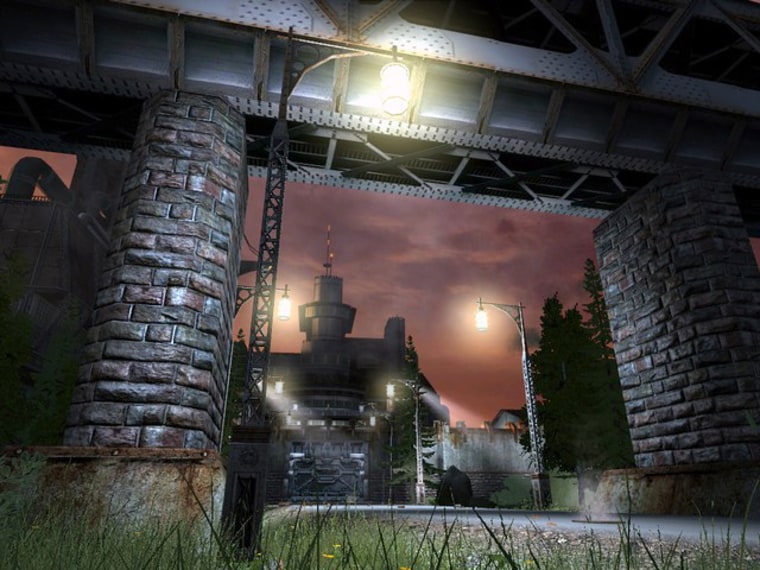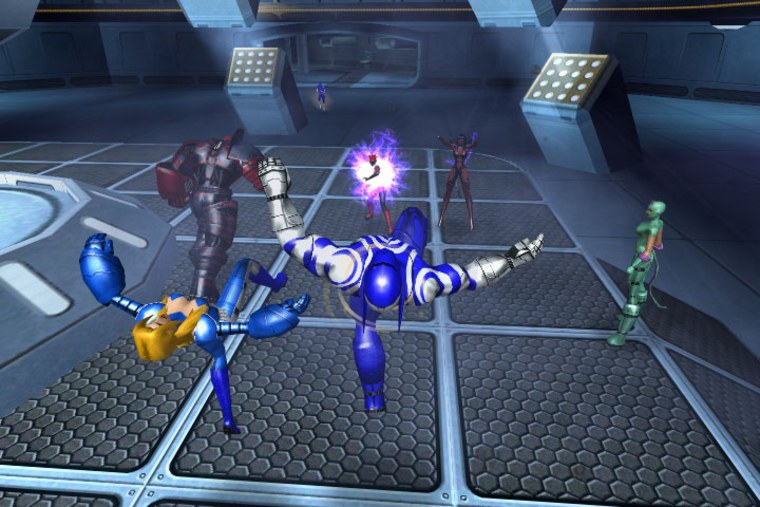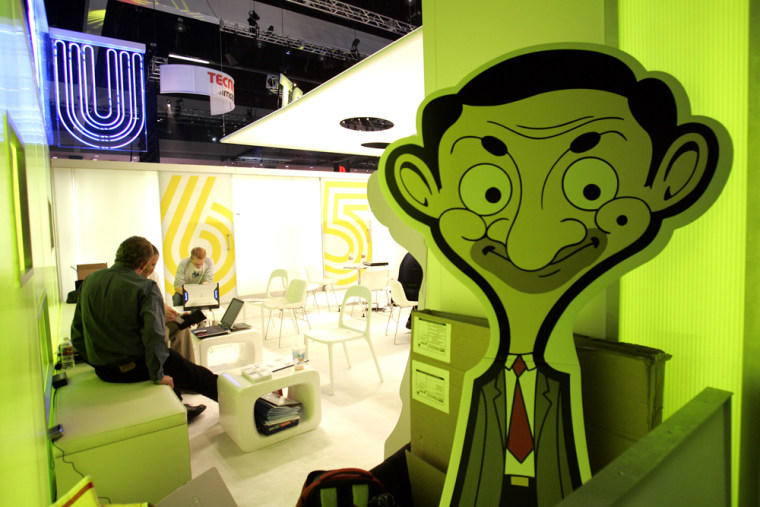The Atari first-person shooter "TimeShift" is the type of game that a hardcore gamer — or a hardcore economist — should love.
For the gamer, there are the guns, the explosions and a unique time-stopping mechanism. Or as "TimeShift's" E3 presenter explained it today: "See how you can stop time to see the bloody chunks!"
For the economist, there's an interesting pedigree. "TimeShift" was designed in the United States, financed by the French-American company Atari/Infogrames and co-developed by a 40-person gaming studio in St. Petersburg, Russia. Among the developers were several former Russian space scientists, a nuclear physicist from Kazakhstan and several over-qualified Russian programmers and artists, including a Ph.D. in applied mathematics and a former architect.
"I always find the talent in Russia better than just about anywhere," said Matthew Karch, a former New York-based immigration lawyer who began the St. Petersburg adventure after Russian immigrant (and computer graphics expert) Andrey Iones sought his help.
Thomas Friedman, eat your heart out.
Nor is "TimeShift" alone in its multinational pedigree. The impacts of globalization can be seen everywhere at E3.

Japan, the country considered the spiritual birthplace of modern video gaming is of course well represented on the show floor. The exhibits erected by Sony and Nintendo resemble mini-cities.
But companies from Taiwan, Germany, Australia, China and other countries traditionally considered outside the periphery of digital entertainment are also flexing their muscle at E3 this year, showing off new game titles and promoting available development studios for hire.
Publishers and developers at E3 say the globalization of gaming is simply a fact of life.
Robert Walsh, CEO of Krome Studios, spends months in the air jetting between Krome's Australian headquarters and the United States. While Krome develops original games such as "Ty the Tasmanian Tiger," much of its income originates in developing games for U.S. publishers such as Electronic Arts, Disney Interactive and THQ.
Contracts from American publishers have helped Krome grow from five to 130 employees in six years.
"From a publisher's perspective, they look for talent anywhere in the world," said Walsh.
Keeping costs down
With video game development an increasingly expensive venture, domestic publishers are looking overseas for talented (and cheaper) game programmers and artists.
"Our aim towards reality or hyperreality is putting pressure on the size of teams and the amount of money you need to spend on making games," said Scott Steinberg, vice president of entertainment marketing at Sega. "The big titles with a more epic scale are going to cost more."
A typical Triple-A title, such as a "Madden" or "Halo," costs anywhere from $3 million to $10 million to make. Games for the next generation of consoles are expected cost double that.
That reality is one of the reasons the Taiwanese government sponsored a booth at E3 this year.
"One of the things we’re trying to do at E3 is to get game publishers to outsource," said Bill Wagner, a director of business development for Taiwan’s Information Integration Inc.
Wagner’s company was one of several government-funded companies that put Taiwan’s IT industry on the map in the 1980s. Now the company, again with government subsidies, is trying to convince U.S. publishers to look to Taiwan's game development industry as a place to send work.
"The reality on the whole protectionist question," said Wagner, "is that I don’t think there are enough people in the U.S. [to create the games] for the next generation [consoles]. The next generation is going to demand so much that they will need to look elsewhere. The bar is going to get set higher and higher."
Seeking a bigger audience
Some foreign game companies, on the other hand, are mainly interested in getting their own games to a wider audience.
"In former times we concentrated on the German speaking market, but now we’re beginning to license games worldwide" said Christopher Kellner, a public relations manager for Germany’s DTP Entertainment.
DTP is showing off "Tony Tough 2" at E3. The game, a sequel to an adventure game which won moderate praise in the U.S. gaming press, was developed not just by Germans, but by people based in Italy, Ukraine and Brazil.
"We look for development teams anywhere we can find them," Kellner said.
Webzen, a major force in the online role-playing market in Asia, is on target to release a major multiplayer title in the U.S. next year. The South Korean company has offices in several countries, including, as of 2005, the United States. It is also co-developing another title, "All Points Bulletin," with the Scotland-based game studio that created "Grand Theft Auto."
Kimok Park, Webzen's strategy officer, said that Asia's success in online gaming has triggered the interest of Western publishers. At the same time, the next generation of consoles, with their focus on online and multiplayer gaming, is motivating more Asian developers to try their hand at the Western market.
"Now that the cultural barrier between the East and the West is diminishing in online gaming, the online games business has become a global industry," Park said.
South Korea’s success story
One of the larger booths at the Los Angeles Convention Center this week belongs to a South Korean company that since its founding in 1997 has not only succeeded in penetrating the North American market, but with a series of games that remain Korean in attitude and game play.
The company is NCsoft, publisher of multiplayer online role-playing games such as "Lineage II" and "City of Heroes." Both are long, involved gaming experiences that reflect South Korea’s love affair with the role-playing game.
"There is a PC gaming mentality in Korea," said Robert Garriott, CEO of NCsoft’s 500-person North American unit. "They are more hard-core. They don’t have the ‘quick fix’ console mentality. In Korea, saying that ‘I’ve suffered through 12 levels’ is a badge of honor."
Online PC gaming is practically a national pastime in South Korea, where it has been helped along by cheap and easy access to broadband Internet. The same is true in China and Taiwan, but the online fever has only recently caught on outside Asia.
China, like Taiwan, is now offering subsidies to game developers, and industry giant Electronic Arts recently moved its worldwide online gaming business to the bustling city of Shanghai.
Mobile phone gaming is another platform stronger outside the United States than in it. So online and mobile games are both increasingly being conceptualized and created outside of the U.S.
"A lot of money and technology are being developed outside the United States," said Garriott. "They are looking at the U.S. and seeing how behind we are."
But Americans may be catching up, at least as far as their game tastes are concerned. NCsoft’s booth at E3 was packed with curious attendees from the moment the show opened.
"There’s some basic stories that are worldwide," Garriott said. "Love, success. You see it with foreign films and you see it with gaming."

NCsoft’s 3.5 million subscribers for the PC multiplayer game "Lineage" may pale in comparison to sales for a "Mario" title from Japan or that most quintessential of American titles, "Grand Theft Auto" (which is, of course, a product of Scotland), but for an intricate, time-consuming Korean title, that’s not bad.
Last year at E3, NCsoft’s "City of Heroes" won best multiplayer game.
And now there’s a flip-side to the success of foreign game publishers in the United States. Garriott’s brother, Richard, is now developing a game for NCsoft. Richard Garriott helped create the U.S. role-playing game with the Ultima series.
"We are an outsourced business from Korea," Garriott pointed out. "Korea decided to outsource product development and networking to us. If we try to say, ‘Hey, we don’t want to participate,’ it will be mean that all of the great advancements won’t happen here."
For Matthew Karch, the globalization of gaming is already a done deal.
"Did you read 'The World is Flat' by Thomas Friedman?," Karch asked, referring to the book on globalization by the New York Times columnist. "It's all there. The Internet. That's us. Working worldwide. That's us."
"He didn't even mention games. I felt like writing to him."
